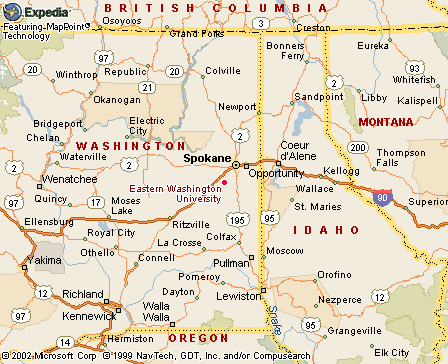|
|
Canku Ota |
|
|
(Many Paths) |
||
|
An Online Newsletter Celebrating Native America |
||
|
April 20, 2002 - Issue 59 |
||
|
|
||
|
Indian Activist Tells Students to Wade into Social Issues |
||
|
by Jim Camden
- Staff writer Spokesman
Review
|
||
|
credits:
Robert J. Shaer - The Spokesman-Review
|
 Native
American students need to think long term, work hard and have trust
to improve themselves, their school and their region, Indian activist
Billy Frank Jr. said Tuesday. Native
American students need to think long term, work hard and have trust
to improve themselves, their school and their region, Indian activist
Billy Frank Jr. said Tuesday.
"Nothing happens if you just sit around," Frank told Eastern Washington University students and guests during a speech for Indian Awareness Week. "You just don't go out the door and smell the roses ... you plant cedar trees. We'll never see them tall, but our children will." Frank, 71, became famous for not sitting around when Northwest Indians found their treaty-guaranteed fishing rights were threatened by state and local governments. Born and raised along the Nisqually River between Tacoma and Olympia, Frank was 14 the first time he was arrested for violating state fishing laws. At the time, the US Army had taken much of the Nisqually Reservation to build Fort Lewis, and the state argued that tribal members had no special treaty rights to fish off their reservations. Frank, his father, Willy Frank, and others challenged the state's interpretation of the treaties, purposely fishing in areas the state was trying to close. "I just kept on getting arrested," Frank told the crowd at EWU's Showalter Hall. "The judge would tell us not to fish, and we went fishing." At first, they were thrown in with a wide range of criminals -- although everyone claimed to be innocent and a great legal strategist, he recalled. After a while, Pierce County set up a special cell for the Indian fishermen, where they went as soon as they were booked in, with automatic trustee status. The fishing protests drew support from such celebrities as Marlon Brando, the Grateful Dead and basketball star Bill Walton. Frank marched with Martin Luther King Jr. in the South, and civil rights activists took up the cause of the tribal fisherman. The case was finally decided in the 1970s in federal court, when US District Judge George Boldt agreed with the tribes that treaties gave them the right to half of the annual salmon harvest. Boldt was a conservative, Frank said, but he listened to the tribal elders when they explained how salmon was essential to Indian life. "We knew the US justice system would work for us at some time in our lives," Frank said. The Boldt decision wasn't the end, but the beginning, Frank said. Federal law soon gave tribes a place at the negotiating table. But they had to sit down with the state, the Army, the dam operators, the commercial and sport fishing interests, the ports and the businesses to find ways to keep the salmon healthy and the water clean. "We're still working at it today," he said. In a similar way, Native American students should "keep moving on" as they look for ways to build on their Indian Studies Program and the cultural opportunities, he said. The campus has a longhouse, he noted, but students need to be sure people know its meaning, and to use it for meetings and ceremonies. "Things don't start big, they start little," Frank said. "It's a small world, and there's more good people than there is bad people. Bring them together." |

|
www.expedia.com |
|
|
||
|
|
||
| Canku Ota is a free Newsletter celebrating Native America, its traditions and accomplishments . We do not provide subscriber or visitor names to anyone. Some articles presented in Canku Ota may contain copyright material. We have received appropriate permissions for republishing any articles. Material appearing here is distributed without profit or monetary gain to those who have expressed an interest. This is in accordance with Title 17 U.S.C. Section 107. | ||
|
Canku Ota is a copyright © 2000, 2001, 2002, 2003 of Vicki Lockard and Paul Barry. |
||
 |
 |
|
|
The "Canku Ota - A Newsletter Celebrating Native America" web site and its design is the |
||
|
Copyright © 1999, 2000, 2001, 2002, 2003 of Paul C. Barry. |
||
|
All Rights Reserved. |
||